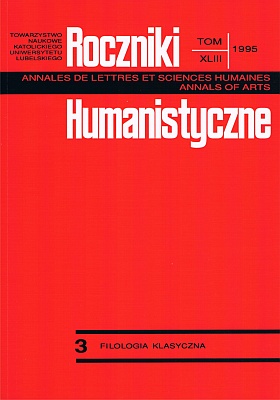O dwu filologach zmarłych w podeszłym wieku daleko od ojczyzny (Stanisław Seliga, Ignacy Wieniewski)
Abstrakt
The study depicts two philologists of classical literature, Stanisław Seliga (1895-1991) and Ignacy Wieniewski (1896-1986), whose activity from Second World War was conducted outside the country. Seliga graduated in classical philology from Warsaw University (1921), earned doctorate under Prof. Tadeusz Zieliński and Prof. Gustaw Przychocki. He taught Latin and Greek in a secondary school, was a lecturer of ancient languages at Warsaw University, assistant professor in Wolna Wszechnica Polska (Free Polish University). He published Latin studies in "Eos": De Cicerone testium vexatore (1924, 27, pp. 101-109); Quibus contumeliis Hieronymus adversarios carpserit (1932/1933, 34, pp. 395-412) and others. He translated and popularized Roman authors. He plucked from obscurity 16th-century paraphrase of Virgil's Georgics. During the Second World War he served in the army, and then organized Polish Schooling; in his quite numerous works he became more a Polish literature teacher.
Ignacy Wieniewski started his studies in Paris and completed them in Lvov with a doctorate under Prof. Stanisław Witkowski. He occupied himself first of all with Homer. However, his work entitled O zapowiadaniu przyszłych zdarzeń u Homera (On Predicting Future Events in Homer, 1928) he presented as habilitation... after 25 years in London at PUNO (Polish University Abroad). In the twenty-year interwar period he taught classical languages in a secondary school and was a higher rank clerk in Ministry of Religious Denominations and Public Enlightenment. He kept on writing all the time. Being abroad he also worked in education, was for a short period professor at PUNO, and became more a man of letters. He joined in anniversary celebrations of Polish poets and writers, he kept watch on antic elements in their writing, wrote short and beautiful works on the Greco-Latin world in Poland, collected them in volumes of miscellaneous studies. He published several such volumes. He translated the Iliad and Aeneid.
Neither Seliga nor Wieniewski had the opportunity to return to Poland to work in their homeland in secondary and high education.
Copyright (c) 1995 Roczniki Humanistyczne

Utwór dostępny jest na licencji Creative Commons Uznanie autorstwa – Użycie niekomercyjne – Bez utworów zależnych 4.0 Międzynarodowe.





